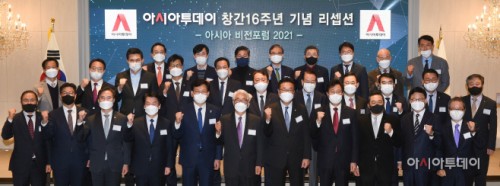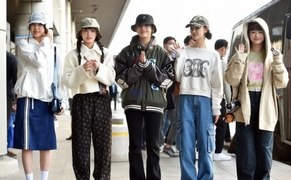 |
| AsiaToday Chairman Song In-jun (6th from the left on front row) poses for commemorative photos along with attendants, including the ruling Democratic Party Chairman Song Young-gil (5th from the left), People’s Party’s presidential candidate Ahn Cheol-soo (4th from the left), and Seoul Mayor Oh Se-hoon (8th from the left) at a reception to commemorate the 16th anniversary of AsiaToday held at the Seoul City Club’s Grand Ballroom in Seoul on Nov. 30, 2021. / Photographed by Jung Jae-hoon |
AsiaToday reporter Choi Won-young
Founded in Nov. 2005, AsiaToday celebrated its 16th anniversary of walking the path of fair journalism. It is also starting a journey towards the 20th anniversary to become one the leading media in Asia. AsiaToday held the ‘Asia Vision Forum 2021’ in celebration of its 16th anniversary, which was attended by hundreds of prominent governmental, political and financial figures.
The forum was attended by many influential political figures of the National Assembly, including the ruling Democratic Party Chairman Song Young-gil, the minor opposition People’s Party leader Ahn Cheol-soo, the Democratic Party’s Rep. Woo Sang-ho, Rep. Park Kwang-on, Rep. Kim Young-bae, Rep. Kim Kyo-heung, and Rep. Yang Ki-dae, as well as the main opposition People Power Party’s Rep. Joo Ho-young, Rep. Kwon Young-se, Rep. Kim Tae-ho, Rep. Cho Hae-jin, Rep. Ha Tae-kyung, Rep. Kim Young-sik, and Rep. Park Jin.
Government and local officials also attended the event, including Seoul Mayor Oh Se-hoon, First Vice Minister of Trade, Industry and Energy Park Jin-kyu and Fair Trade Commission Vice Chairperson Kim Jae-shin. From the business circle, Korea International Trade Association Chairman and LS Group Chairman Koo Ja-yeol, Woori Financial Group Chairman Son Tae-seung, NH NongHyup Bank CEO Kwon Joon-hak and Shinhan Life CEO Sung Dae-kyu were present.
“AsiaToday will strive to reach around the world as a global comprehensive media,” said AsiaToday Chairman Song In-jun in his address, along with an ambition to respect common sense and contribute to making the world more just as a media for the country and the people beyond a time of chaos and upheaval.
The People’s Party’s presidential candidate Ahn Cheol-soo delivered a congratulatory speech on “carbon neutrality,” the theme of the forum. “Just as we can make a living with Samsung Electronics’ super-gap technology in memory chips, we can make it happen for the hydrogen industry as well with super-gap technology,” Ahn said. “If we take advantage of the climate crisis as a stepping stone for the country’s economic growth and secure at least five super-gap technologies, we could have five or more global companies like Samsung Electronics, and be part of G5,” he said.
“We have only eight years left to cut carbon emissions by 40 percent in 2030, putting a huge burden on the industry,” said DP Chairman Song Youg-gil. “The Democratic Party believes that carbon neutralization should be approached scientifically with an open attitude,” he added. “The city of Seoul will do its best to create an exemplary carbon-neutral city model and actively support the activities of companies that take the lead in ESG management and realization of social values,” Seoul Mayor Oh Se-hoon said.
After the reception, the forum was held under the theme of ‘carbon neutrality and the realization of social values.” The National Assembly and the government, as well as companies and academia, examined the current condition and problems, and talked about directions for each task.
“Achieving the goal of carbon neutrality by 2050 will bring us great economic and social challenges and changes, but will also bring greater opportunities and development,” said Lim Choon-taek, the head of the Korea Energy Economics Institute, in his keynote speech. “Carbon neutrality will transform South Korea into a leading country in climate environment,” he said.
Hosted by AsiaToday, the forum was sponsored by the Ministry of Economy and Finance, the Ministry of Trade, Industry and Energy, the Ministry of Environment, the Fair Trade Commission, the Financial Services Commission, and the Korea Energy Economics Institute.
#ASIATODAY #anniversary #Asia Vision Forum 2021
Copyright by Asiatoday
Most Read
-
1
-
2
-
3
-
4
-
5
-
6
-
7





















